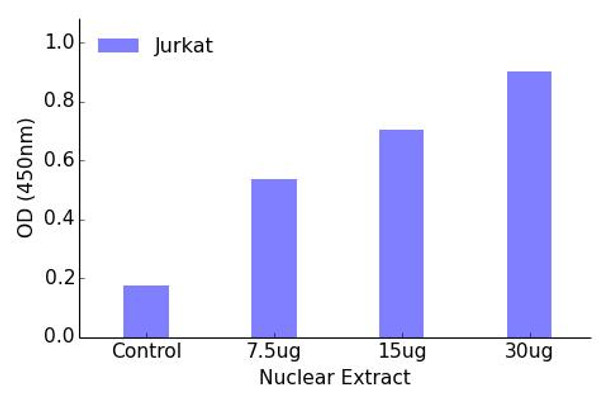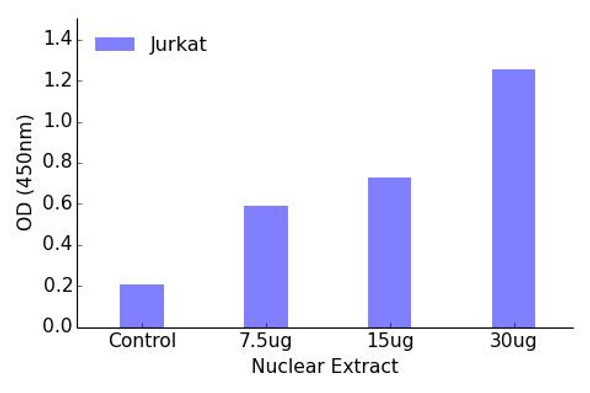Description
Myc (Phospho-Thr58)Transcription Factor Activity Assay
The MYC Phospho-Thr58 Transcription Factor Activity Assay is a highly sensitive and specific assay designed to measure the transcriptional activity of MYC, a key regulator of cell proliferation and growth. This assay is ideal for studying the role of MYC in various diseases, including cancer, as aberrant MYC activity is often associated with uncontrolled cell growth.This assay kit provides accurate and reproducible results, making it suitable for a wide range of research applications.
By measuring the phosphorylation of MYC at threonine 58, researchers can gain valuable insights into the activity of this important transcription factor and its role in regulating gene expression.Overall, the MYC Phospho-Thr58 Transcription Factor Activity Assay is a valuable tool for studying MYC signaling pathways and identifying potential therapeutic targets for diseases driven by dysregulated MYC activity.
| Product Name: | Myc (Phospho-Thr58) Transcription Factor Activity Assay |
| Product Code: | TFAB00037 |
| Target: | Myc (Phospho-Thr58) |
| Synonyms: | Class E basic helix-loop-helix protein 39, bHLHe39, Proto-oncogene c-Myc, Transcription factor p64 |
| Reactivity: | Human, Mouse, Rat |
| Sample Types: | Nuclear or cell lysates |
The Assay Genie Myc (Phospho-Thr58) transcription factor activity assay allows for the detection and qualitative analysis of Myc (Phospho-Thr58) active transcription factors in eukaryotic nuclear or cell lysates.
Assay Genie ELISA kits are designed to significantly reduce experiment time and ensure sensitivity and flexibility for high-throughput screening.
| Assay Time: | 4.5 hours |
| Detection Method: | Colorimetric 450 nm |
| Size: | 12 x 8-Well Microstrips |
| Storage: | 4°C for 6 months |
| UniProt Protein Function: | Myc: a proto-oncogenic transcription factor that plays a role in cell proliferation, apoptosis and in the development of human tumors. Seems to activate the transcription of growth-related genes. |
| UniProt Protein Details: | Protein type:DNA-binding; Nucleolus; Oncoprotein; Transcription factor Chromosomal Location of Human Ortholog: 8q24.21 Cellular Component: nucleoplasm; protein complex; nucleolus; nucleus; cytosol Molecular Function:protein dimerization activity; protein binding; DNA binding; protein complex binding; transcription factor binding; transcription factor activity Biological Process: oxygen transport; cellular iron ion homeostasis; positive regulation of transcription, DNA-dependent; positive regulation of caspase activity; negative regulation of transcription from RNA polymerase II promoter; Wnt receptor signaling pathway through beta-catenin; chromosome organization and biogenesis; positive regulation of fibroblast proliferation; transforming growth factor beta receptor signaling pathway; positive regulation of cell proliferation; positive regulation of mesenchymal cell proliferation; response to gamma radiation; cell cycle arrest; response to drug; transcription initiation from RNA polymerase II promoter; Notch signaling pathway; regulation of telomere maintenance; transcription, DNA-dependent; MAPKKK cascade; negative regulation of cell division; negative regulation of stress-activated MAPK cascade; negative regulation of monocyte differentiation; chromatin remodeling; ureteric bud branching; regulation of gene expression; negative regulation of fibroblast proliferation; energy reserve metabolic process; gene expression; positive regulation of transcription from RNA polymerase II promoter; response to DNA damage stimulus; positive regulation of epithelial cell proliferation; negative regulation of apoptosis Disease: Burkitt Lymphoma |
| NCBI Summary: | The protein encoded by this gene is a multifunctional, nuclear phosphoprotein that plays a role in cell cycle progression, apoptosis and cellular transformation. It functions as a transcription factor that regulates transcription of specific target genes. Mutations, overexpression, rearrangement and translocation of this gene have been associated with a variety of hematopoietic tumors, leukemias and lymphomas, including Burkitt lymphoma. There is evidence to show that alternative translation initiations from an upstream, in-frame non-AUG (CUG) and a downstream AUG start site result in the production of two isoforms with distinct N-termini. The synthesis of non-AUG initiated protein is suppressed in Burkitt's lymphomas, suggesting its importance in the normal function of this gene. [provided by RefSeq, Jul 2008] |
| UniProt Code: | P01106 |
| NCBI GenInfo Identifier: | 127619 |
| NCBI Gene ID: | 4609 |
| NCBI Accession: | P01106.1 |
| UniProt Secondary Accession: | P01106,P01107, Q14026, A8WFE7, |
| UniProt Related Accession: | P01106 |
| Molecular Weight: | 439 |
| NCBI Full Name: | Myc proto-oncogene protein |
| NCBI Synonym Full Names: | v-myc avian myelocytomatosis viral oncogene homolog |
| NCBI Official Symbol: | MYC |
| NCBI Official Synonym Symbols: | MRTL; MYCC; c-Myc; bHLHe39 |
| NCBI Protein Information: | myc proto-oncogene protein; proto-oncogene c-Myc; transcription factor p64; class E basic helix-loop-helix protein 39; avian myelocytomatosis viral oncogene homolog; v-myc myelocytomatosis viral oncogene homolog; myc-related translation/localization regulatory factor |
| UniProt Protein Name: | Myc proto-oncogene protein |
| UniProt Synonym Protein Names: | Class E basic helix-loop-helix protein 39; bHLHe39; Proto-oncogene c-Myc; Transcription factor p64 |
| Protein Family: | Myc protein |
| UniProt Gene Name: | MYC |
| UniProt Entry Name: | MYC_HUMAN |






